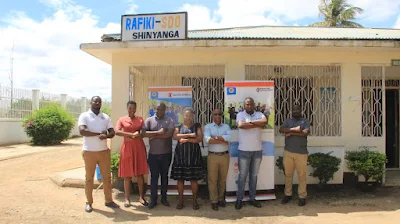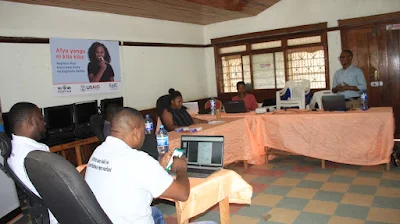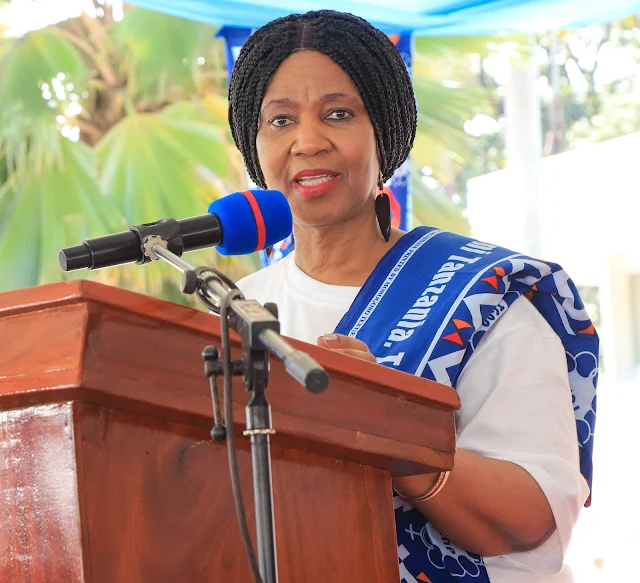By Dr. Fatma Waziri
In the Southern Regions of Tanzania, where
the struggle against youth involvement in violent extremism is both a moral and
strategic imperative, the Dumisha Amani project emerges as a beacon of hope. Implemented
within the districts bordering Mozambique, such as Kilwa, Nachingwea, Mtwara,
Tandahimba, Tunduru, Songea Rural, and Nyasa, this initiative uncovers the
stark challenges faced by Tanzanian youth: economic disparities, limited
educational opportunities, and a digital divide. Recent data from World Bank, reveals
a poverty rate of approximately 25.7%, emphasizing the urgent need for
interventions to uplift the vulnerable youth population.
In considering the status of literacy that
have been observed in the project area; the educational landscape in Tanzania
reveals a stark disparity that amplifies the challenges faced by its youth.
UNESCO's recent data, indicating a net enrolment rate in secondary education of
merely 44.8%, underscores the persistent educational gaps that hinder the
holistic and equitable development of the country's younger generation. This
deficiency not only limits their access to quality education but also becomes a
contributing factor to the vulnerability of youth to extremist ideologies.
Compounding this educational deficit is
the digital divide illuminated by the International Telecommunication Union
(ITU). As of 2023, a mere 44.8% of Tanzanians have access to the internet. This
glaring statistic further emphasizes the limitations imposed on the youth,
curtailing their exposure to diverse perspectives and essential educational
resources and other opportunities available online. In an era where digital
literacy is increasingly pivotal, such restricted access inhibits the youth
from harnessing the full potential of the internet as a tool for economic, education,
self-improvement, and global connectivity.
The confluence of these educational and
digital disparities creates a formidable barrier for Tanzanian youth, hindering
not only their academic growth but also their ability to navigate an
interconnected world. Addressing these gaps becomes imperative not only for the
empowerment of individuals but also for the overall resilience and progress of
the nation. Initiatives that bridge these divides, such as the Dumisha Amani
project, emerge as crucial stepping stones towards a more inclusive and
empowered Tanzanian youth, ready to shape a brighter future.
Upon
the successful implementation of the Dumisha Amani Project, a collaborative
effort between GPF and UNDP in partnership with targeted youth in their respective
districts, this initiative, also involving the active engagement of Local
Government authorities and the Prime Minister's office, exemplifies a
comprehensive approach to fostering inclusivity and equitable development in
the region.
Through
the establishment of four youth centers, the Dumisha Amani Project not only
enhances digital connectivity but also directly contributes to expanding
internet access among the youth, thereby opening doors to a world of
information and opportunity.
The
inclusion of digital literacy programs, integrated into the Dumisha Amani
Project's youth engagement and capacity-building initiatives, becomes a crucial
component. These programs ensure that the youth in these regions are equipped
with the necessary skills to navigate the online world responsibly, promoting
critical thinking and discernment.
Creating
more doors of opportunities and hope to the youth, as emphasized in the Dumisha
Amani Project, becomes a catalyst for skill development and employment opportunities.
Drawing on data from the International Labour Organization (ILO) indicating a
growing demand for digital skills in the job market, the project, through
partnerships with tech companies, provides additional resources and expertise
to support youth in developing digital skills aligned with the evolving demands
of the modern workforce.
By
addressing economic disparities, educational gaps, and limited access to
information, the Dumisha Amani Project empowers Tanzanian youth to actively
counter extremist narratives. The integration of digital inclusion strategies,
coupled with the collaborative efforts of GPF, UNDP, the Prime Minister's
office, Local Government authorities and youth, signifies a transformative
journey toward lasting peace and sustainable development, fostering a more
inclusive, resilient, and peaceful society in Tanzania.




















































